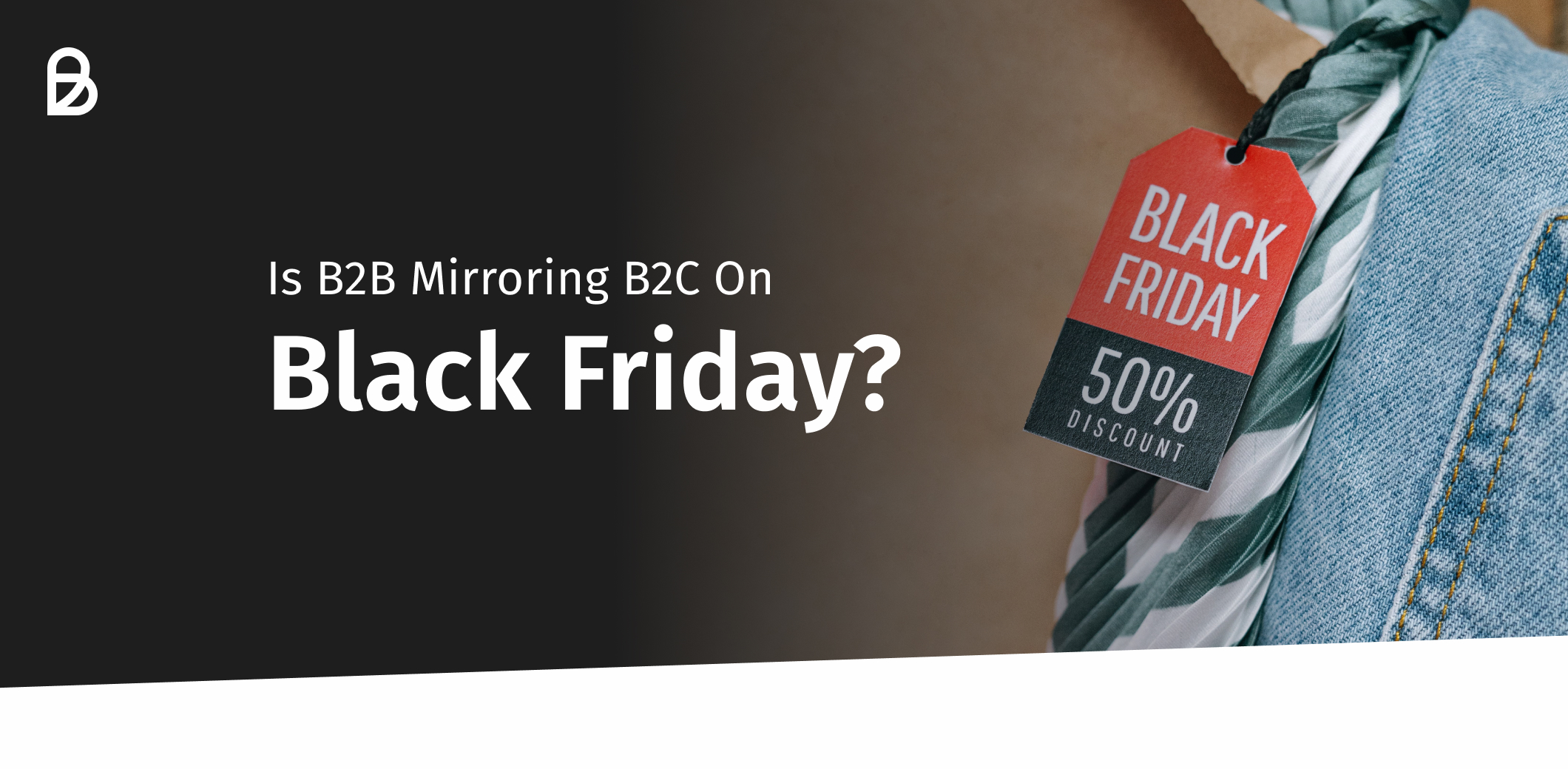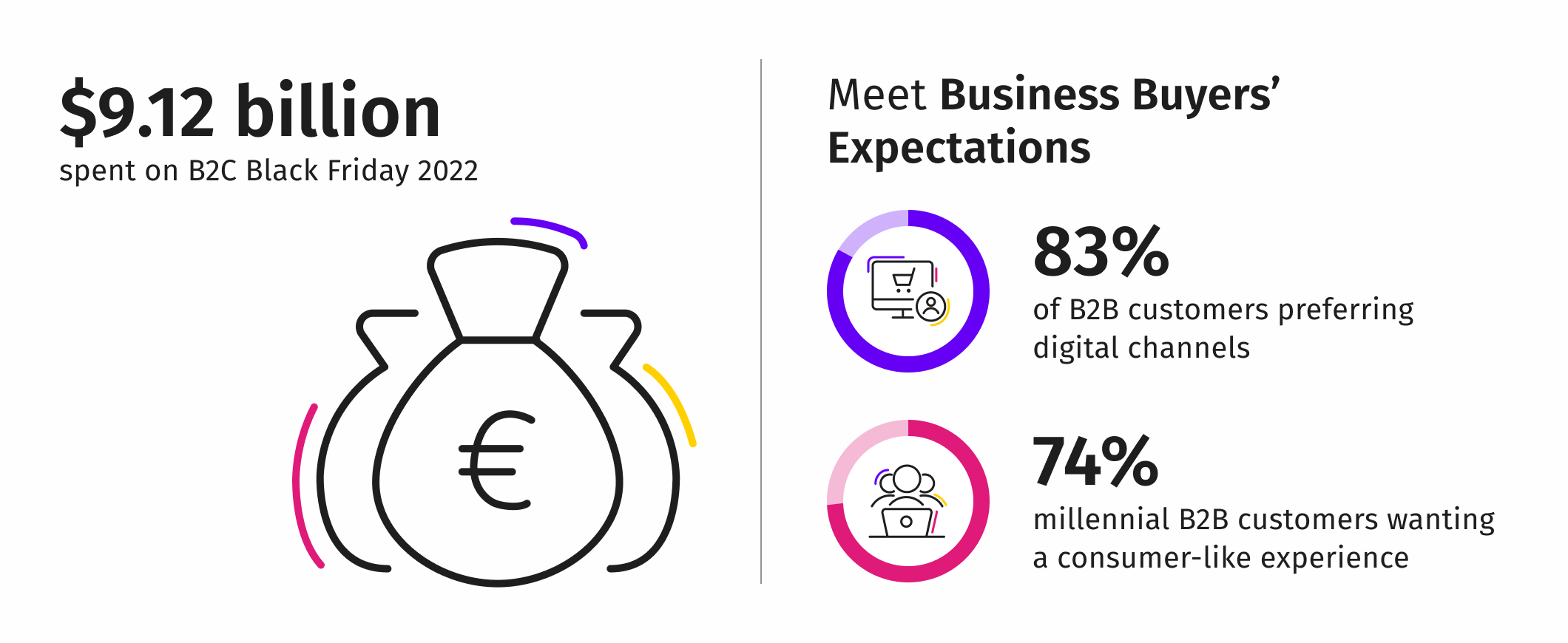Is B2B Black Friday Mirroring B2C?
Despite the difference in wording, it’s important to recognize that B2B customers share something fundamental with B2C consumers — they’re both human. Naturally, events from everyday life will influence their day-to-day business decisions. Even among well-known sales days such as Cyber Monday, Single’s Day, etc., Black Friday still stands out as THE day for scoring a deal. Personal shoppers aren't the only customers looking for a bargain, with business customers now wanting a piece of the action. But should B2B retailers attempt to capitalize on the biggest Friday in e-commerce? To answer this, let's take a closer look at Black Friday for B2B businesses.

About Black Friday
Black Friday originated in the U.S. during the 1960s and was coined in Philadelphia for the heavy traffic and crowds that jammed streets the day after Thanksgiving. What began as a U.S. sales event has since grown into a global shopping phenomenon, with businesses around the world, particularly B2C sellers, appealing to customers with sales and deals.
2022 Was a Big Year for B2C Black Friday
A record-breaking $9.12 billion was spent in just one day last year in the US, as reported by Adobe Analytics. To put this in perspective, an average online shopping day in the US typically sees sales ranging between $2 to $3 billion. The same trend can be seen in Europe with Amazon marketplaces in Germany showing a sales uplift of over 270% leading up to Black Friday and the day itself increasing by 440%. Additionally, around 74% of German shoppers stated they would use the day to purchase Christmas presents at a lower price last year. The numbers speak for themselves, making Black Friday undeniably a big deal. But what does this mean for B2B retailers?

Can B2B Sellers Benefit from Black Friday?
The landscape of Black Friday is shifting. Sales events are moving from brick-and-mortar stores to online platforms, and spilling over from personal shopping to business buying. Business customers’ expectations are also changing to be on the lookout for Black Friday deals. While it's unlikely that B2B sales will surpass B2C on this day, sellers catering to this sector could see an increase in sales. However, certain industries of the B2B sphere are more likely to see success, such as retailers selling B2C-like products and services: Office furniture and DIY suppliers for example.
Meet Business Buyers’ Expectations
The traditional B2B buying and selling experience has undergone a drastic shift due to modern digital lifestyles. In fact, business customers now prefer to shop online, with 83% preferring to use digital channels. Expectations are also higher, with 74% of millennial business customers prepared to switch retailers if they don’t receive a consumer-like experience. With B2B mirroring B2C trends, business customers also expect to see Black Friday deals from their favorite businesses. Savvy retailers will take this opportunity to prepare, market, and sell big.
Buyers also expect to see certain payment options available at checkout. Insights from a recent survey conducted by Billie and HHL Leipzig Graduate School of Management, which polled 800 B2B buyers, reveal that a significant number of online stores offer payment by invoice. This prevalence has established it as the preferred choice among buyers, indicating a trend where the availability of payment options influences demand. Ultimately, providing preferred payment methods is essential in aligning with buyers’ expectations.
Leverage Purchasing Psychology and Insights
The psychology behind buying decisions is a powerful tool that can be used every day of the year and when preparing for major sales events like Black Friday. There is extensive research around this topic and two important psychological effects that tie in nicely with promoting Black Friday deals are:
Status Quo Bias: Reports that buyers and B2B buyers, like most people, tend to avoid change, due to unknown risks. This can be used by merchants communicating that not changing or buying is more risky, due to missing out on a deal.
Loss Aversion theory: Suggests that people feel the pain of losing something more intensely than the pleasure of gaining something of equal value. Considering potential losses have a stronger impact, consider using FOMO by not taking advantage of deals on offer.
A Seller’s B2B Playbook for Black Friday
With Black Friday fast approaching, B2B sellers must strategically position themselves to stand out against the competition and attract customers eager for the best deals of the year. So, what does an effective Black Friday strategy for B2B merchants involve? Below are some useful tips to help:
Know the Market: Before launching a large-scale Black Friday campaign, understanding the market and trends is important to market to customers effectively. Newcomers promoting on Black Friday can consider a modest marketing campaign to understand customer responses, gain insights, and lay the groundwork for future years.
Leverage Historical Data: Examine past sales to predict stock needs and sales channel distribution. Insights on which products sold well and where, plus current market trends, will ensure inventories last and can meet demands while not overstocking. If no past sales history exists, it can help to look at what competitors are advertizing or selling.
Boost Visibility: Given B2B Black Friday is up and coming, participating in itself can provide a competitive edge. But, it's essential to announce participation. Marketing tactics like launching a website countdown, pre-order alerts, announcement posts, and CRM email campaigns can increase awareness and support sales traffic.
Package Compelling Offers: Some products or services aren't suitable for Black Friday, but creativity can bridge the gap. By offering bundled products, “buy one get one free” deals on related services, and value add-ons like free design assets or consultations, businesses like consultancy firms can still partake in Black Friday.
Optimize the Purchasing Experience: Black Friday needs an optimized order and payment process. A large increase in traffic and sales snowballs into more orders. Therefore the checkout experience needs to be frictionless with automated payment acceptance as well as being scalable, and not crash.
Prioritize Payment Options: Including popular B2B payment options such as, Buy Now, Pay Later can increase checkout conversions. Adobe Digital Insights showed a 78% spike in B2C BNPL usage over Black Friday, a trend mirrored by Billie's data, showing a 60% BNPL increase on Black Friday, versus other Fridays.
In the era where B2B and B2C trends increasingly mirror each other, B2B merchants have a golden opportunity on Black Friday. With the right preparation and strategy, this day can mark a significant increase in sales and set the tone for the year ahead. Remember, the essence of Black Friday in the B2B space isn't just about a single day of sales but about understanding your customers, meeting their expectations, and building long-term relationships. Every day can be Black Friday with the right tools in place.